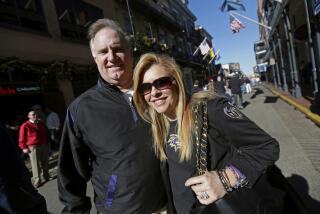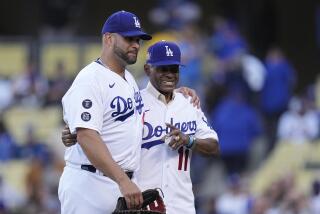Jefferies Should Note Mantle Was Sent Down
- Share via
NEW YORK — Fathers say to sons: This hurts me more than it hurts you. They say it out of affection. Managers say it, for their own reasons, to players. Davey Johnson ought to say it to Gregg Jefferies.
It would be for Jefferies’ good. Also for the good of all of them. Go to Tidewater, have a good month, get your confidence back and nothing will stop you.
Of course, Jefferies can’t see it that way. He’s 21 years old. He thinks the world began the day he signed his contract. “If I went down, I’d think, ‘God, I failed,”’ Jefferies said recently. The whimper said it ought to be done.
It wouldn’t be the first time. Casey Stengel saw he had to do that with Mickey Mantle in 1951. “What’s happening to Jefferies, it was a lot like that for me,” Mantle noted Thursday. “If I was Jefferies, I wouldn’t mind. They send a lot of guys down and they come back. Me and Casey both cried. Now that I look back, it was the best thing that coulda happened.”
And Mantle, at 19, was doing better than Jefferies. The cone of silence that surrounds Jefferies in the clubhouse speaks especially loud. Teammates have little conversation for him and, one veteran noted, little compassion. Others note that Jefferies has earned it. Teammates resent what they see as preferential treatment from the manager for the projected rookie sensation. Darryl Strawberry doesn’t want to hit behind Jefferies. Others want him out of the lineup. Davey Johnson has said he’s afraid demotion would break Jefferies’ psyche.
An umpire reported hearing Jefferies muttering to himself at second base that he can’t hit and doesn’t understand it. Said Jefferies a few days later: “I don’t know what the hell is going on with me ... I don’t know what I’m doing there hitting. It’s a joke.” The psyche is already cracked.
“I remember one thing: that I can’t remember because I was so scared,” Mantle said. “Can you imagine going from Joplin (Mo.) to New York City?” Jefferies played last year in Triple-A, not in the 1950 equivalent of Mantle’s Class C Western Association. He’s from Millbrae, Calif., not Mantle’s Commerce, Okla., and should be a little more sophisticated. Both were made into switch hitters by their fathers. Both were trying to learn a new position at the same time they were learning to hit big-league pitching. Jefferies, who was switched from third to second base, was such a hotshot in September when the Mets were starving for runs. He was so good that he almost won Rookie of the Year, hitting .321 for 29 games. The sky was his limit, not .187.
“I could see I wasn’t doin’ as good as Casey said I would,” Mantle drawled. “He had me, Babe Ruth, Lou Gehrig and Joe DiMaggio rolled into one. It didn’t happen right away. I was striking out so much it was embarrassing. I’d throw the bat all the time. My attitude was terrible. Sending me out, you could say was attitude adjustment.
“I’d talk to myself. Hell, nobody would sit near the bat rack when I was up.”
He had close friends in Billy Martin and Whitey Ford, but he’d sulk in the outfield, until Gene Woodling, Hank Bauer or Allie Reynolds let him know he was jeopardizing their money.
Mantle had played shortstop at Joplin and hit .383 with 26 homers and 136 runs batted in for 137 games. When Stengel sent him back to Kansas City of the American Association on July 15 after 69 games, Mantle was hitting .261 with seven homers and leading the Yankees with 45 RBI, even though he was batting leadoff. He also had struck out 52 times in 245 at-bats. And Stengel said, “This is gonna hurt me more than you ...”
“I wasn’t wantin’ it to happen, but as I look back, I had lost all confidence,” Mantle said. He was so shaken that this young man who could hit balls over buildings went to Kansas City and bunted for a hit on his first time at bat. And George Selkirk, the manager, got all over him. He said he knew Mantle could bunt and he could run, but he was there to hit so he could go back up.
Mantle proceeded to go 21 at-bats without a hit. Remember how Willie Mays was hitless in his first 21 at-bats with the Giants and shrilled to Leo Durocher, the manager: “Send me down, Mr. Leo. I can’t hit up here.” Mays stayed, and the rest is history.
So is Mantle’s career, but it wasn’t that direct. He phoned his dad, as Jefferies does regularly. “I’d given up on myself,” Mantle recalled. “I told my dad, ‘Heck, I can’t hit in New York and I can’t hit in Kansas City; I might as well chuck it in.”’
Mutt Mantle drove from Commerce to Kansas City. “Instead of telling me to hang in, he started throwing my things into a bag,” Mantle said.
He asked his father what he was doing and Mutt Mantle said: “I thought I raised you as a man; you ain’t nothin’ but a coward.”
Mickey talked himself into another chance and started hitting like anything. He had a whole season in six weeks, hitting .361 with 50 RBI in 40 games. The story is on “Mickey Mantle, the American Dream Comes to Life,” his new video. “At all video stores, $19.95,” Mantle, the entrepreneur, said.
He was called back up in late August, and after that it’s history.
Jefferies ought to understand the story. So should the Mets. Being sent back for the moment isn’t a disaster. As Stengel put it, “It wouldn’t make you blind.”
More to Read
Go beyond the scoreboard
Get the latest on L.A.'s teams in the daily Sports Report newsletter.
You may occasionally receive promotional content from the Los Angeles Times.










